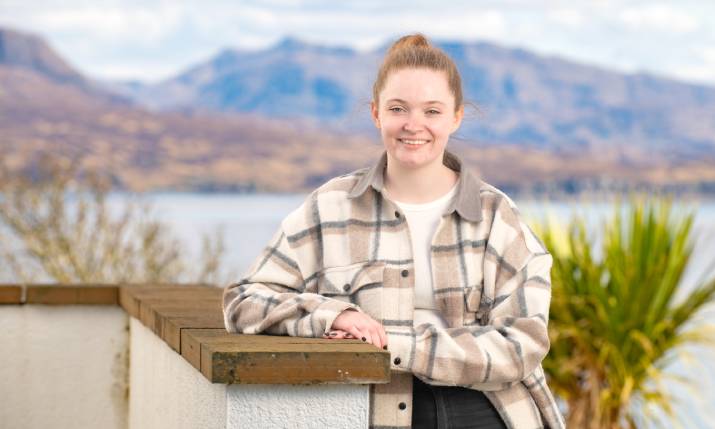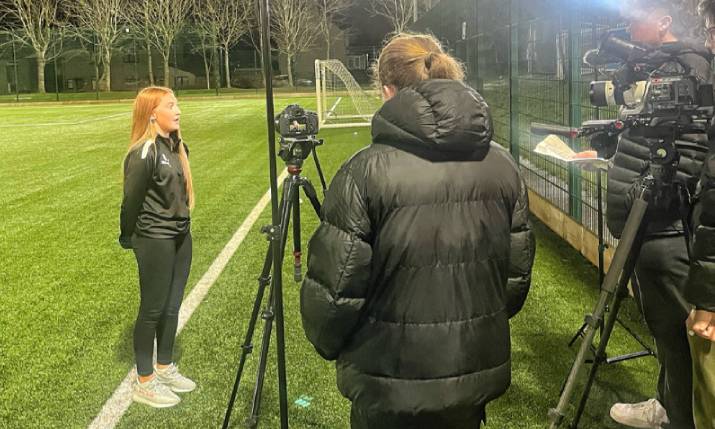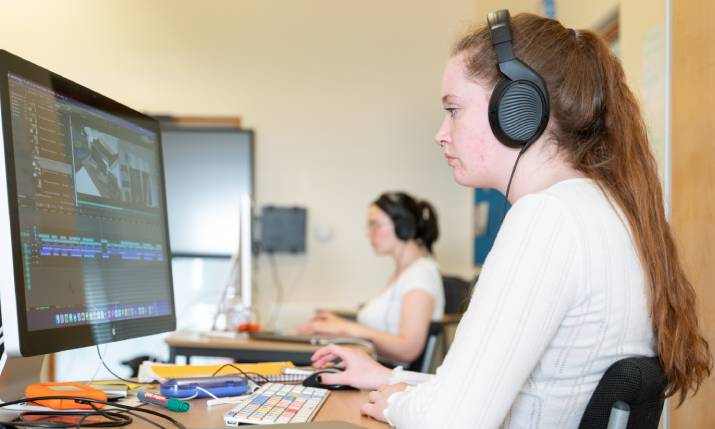Stepping Stones: Working for BBC Scotland and BBC Alba with production trainee at Sunset+Vine Marley MacColl

Sunset+Vine’s Marley MacColl
Marley MacColl, production trainee at content producer Sunset+Vine, works mostly on the firm’s BBC Alba contract and also across BBC Scotland. She is getting a lot of experience in a wide variety of roles from filming to translating billings into Gaelic. MacColl’s story is part of our series of Stepping Stones articles, which showcase young women moving up the ladder behind the camera in sports broadcasting.
What is your job role today and what do you love about it?
I’m currently a production trainee, I love the range of roles I’ve had experience with and how different the job can be each day.

Sunset+Vine’s Marley MacColl [centre] working on a BBC Alba shoot at Bonnyrigg Rose Ladies Football Club, Scotland
Lots of different things! I mostly work on our BBC Alba contract, but I’ve had a couple opportunities to work with BBC Scotland for the Scottish Cup. On match days I take on the role of a camera AP, filming team arrivals, inside the changing rooms, warm ups and fans and colour shots for the top of the programme.
“I like to ensure that I put 100% effort into every task that I complete. I try to make myself available to help out with anything that can make our productions smoother, whether it’s filming for our programmes, or a tea run during our live OB’s”
I’ll occasionally film players and teams during the match if it’s relevant for a future feature. During the matches, I upload clips of our matches to BBC Alba’s X feed, with captions in both English and Gaelic. I also help out on shoots for our half time features, speaking to different teams and players and filming them at training or sometimes at their places of work.
I assist with different production paperwork, keeping track of our Albert Carbon footprint, helping fill out Silvermouse paperwork, and clearing music to be used in our programmes. I keep up to date with our media management, ensuring match and feature footage is backed correctly and copies of our matches are sent to clubs if requested. I also aid in translating billings into Gaelic for our programmes.
Can you talk us through your relevant education that helped you break into the sports broadcasting industry?
I applied for a course at Sabhal Mòr Ostaig, UHI, Gaelic Media DipHe which I am still currently a part of it is a two year course, which, within the first year, introduces you to world of media. Through working in a production environment, with industry professionals, I learned and developed a wide range of industry-specific knowledge and skills, which sets myself up for work in the media industry.
Through this I have also had a few opportunities to work as a runner for different productions, which was a great way to get experience. The second year of the course is a 10 month placement with a media company or broadcaster, which I am now seven months into, and it has given me first-hand experience in the industry.

Marley MacColl editing a university project
What happened next to get you where you are today?
It’s only been seven months since I’ve started, but I like to ensure that I put 100% effort into every task that I complete. I try to make myself available to help out with anything that can make our productions smoother, whether it’s filming for our programmes, or a tea run during our live OB’s.
Where job would you like to be in in five to years’ time? What are your career goals?
I would love to still be in sports broadcasting, hopefully self-shooting, and producing VTs for matches, or even producing the live programmes themselves.
Can you give us some top tips that really helped you get where you are today?
Don’t be scared to give things a shot, if opportunities come up and you’re a bit uncertain, just do it! You never know what’ll come out of it, and if it doesn’t work out then that gives you something to work on and develop!
Can you give us some tips on things not to do or to avoid when trying to get a role you really want?
I think it’s important not to turn down opportunities just because it’s not exactly what you want to do, all opportunities can help widen your skills and hopefully take you one step forward to the role you really want.
What would you say are the barriers to getting a job in the broadcast industry?
It’s a very popular industry so I think it can be difficult to set yourself aside from other people.
What would you recommend to other people thinking of working in the broadcast industry?
Give it a shot! It’s an amazing job and can be really fun to work on different projects and programmes!

